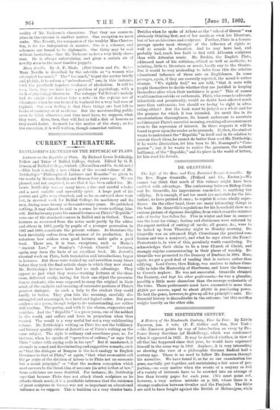C URRENT LITERATURE.
NETTLESHIrS LECTURES ON THE REPUBLIC OF PLATO.
Lectures on the Republic of Plato. By Richard Lewis Nottleship, Fellow and Tutor of Balliol College, Oxford. Edited by G. R. Benson, of Bailie' College, Oxford. (Macmillan and Co. Ss. 6d. net.) —This hook is really a new edition of the second volume of Mr. Nettleship's "Philosophical Lectures and Remains" as given to the world by Messrs. Bradley and Benson four years ago. We are pleased, and not surprised, to see that it has been called for. Mr. Lewis Nettleship was, as many know, a fine and careful scholar and a most amiable and unworldly spirit. A large part of his powers and gifts were absorbed, and so far as outward show went lost, in devoted work for Banjo' College, its machinery and its men, during some twenty or five-and-twenty years. Ho published nothing, it may almost be said in a sense he wrote nothing, him- self. But for twenty years his annual lectures on Plato's "Republic " were one of the standard courses in Balliol and in Oxford. These lectures as recovered from the notes made partly by the editor and others in 188, partly by pupils of a younger generation in 1887 and 1888, constitute the present volume. As literature the book inevitably suffers from the manner of its production. It is notorious how seldom even good lectures make quite a good book. There are, it is true, exceptions, such as Maine's "Ancient Law," or Stanley's "Jewish Church." Lectures, again, may form the basis of an excellent book. Mr. Jowett's classical work on Plato, both translation and introductions, began in lectures. But these were worked up and rewritten many times before they took the final artistic shape in which they now stand. Mr. Nettleship's lectures have had no such advantage. They appear as just what they were,—working lectures of the class- room, delivered orally, having for their one object the presenta- tion to students, who were supposed to carry the original in their mind, of the analysis and meaning of successive portions of Plato's greatest dialogue. As such a help to the student they could hardly be better. They give him the meaning, carefully dis- entangled and rearranged, in a lucid and logical order. But prose analyses of a poem, though helps to its understanding, are rather dull reading. The poetry, and with it the charm, evaporates and vanishes. And the "Republic" is a prose poem,, one of the noblest in the world, and suffers and loses in proportion when thus treated. The result is a very useful but not a very exhilarating volume. Mr. Nettleship's writing on Plato has not the brilliancy anil literary quality either of Jowett's or of Pater's writing on the same subject. The style is ordinary and sometimes poor, as, for instance, when he speaks of "spreaders of culture," or says that Plato "writes with crying evils in his eye." But if unadorned, it abounds in sound and discriminating and suggestive remarks, such as "that the dialogue of Bunyan is the best analogy in English literature to that of Plato," or again, "that what economists call the -jet, ;ciplo of the division of labour is to Plato not an economic but a moral principle," or "that the modern conception which most answers to the Greek idea of measure (in arts) is that of law." Some criticisms are more doubtful. For instance, Mr. Nettleship says that because Plato does not attack Greek sculpture as he attacks Greek music, it is a justifiable inference that the existence of great sculpture in Greece was not so important an educational influence as we suppose. This is buildinir on a very slender basis.
Pericles when he spoke of Athens as the "school of Greece" was obviously thinking first, not of her music, or even her literature, but of her architecture and sculpture. Further, Plato in a famous passage speaks most strongly of the influence of sights as well as sounds in education. And he may have had, and probably had, much less fault to find with Athenian sculpture than with Athenian music. Mr. Ruskin, the English Plato, addressed most of his criticism, ethical as well as aesthetic, to painting, little to literature or music, hardly any to the theatre. But it would be very misleading to infer from this the relative educational influence of these arts on Englishmen. In some passages, again, if they are correctly reported, the moral is rather strange. "We rightly feel," we are told, "that it rests with people themselves to decide whether they are justified in keeping themselves alive when their usefulness is gone." This of course would sanction suicide or euthanasia. Plato, who seems to advocate infanticide and promiscuity, would no doubt have allowed much more than euthanasia; but should we to-day be right in advo- cating either? But the book must be judged as a whole and for the purpose for which it was intended. Its merit lies in its unostentatious thoroughness, its honest endeavour to ascertain and interpret Plato's essential meaning, avoiding all overstatement even to the repression of interest. In these respects it will be found to grow upon the reader as he proceeds. If, then, the student wants to understand the" Republic" in itself and in its relation to current Greek ideas, he cannot do better than read Mr. Nettleship ; if he wants illustration, let him turn to Mr. Bosanquet's " Com- panion " ; but if he wants to realise the greatness, the radiant brilliancy, of the "Republic," and its place in the world of letters, let him read his Jowett.






































 Previous page
Previous page